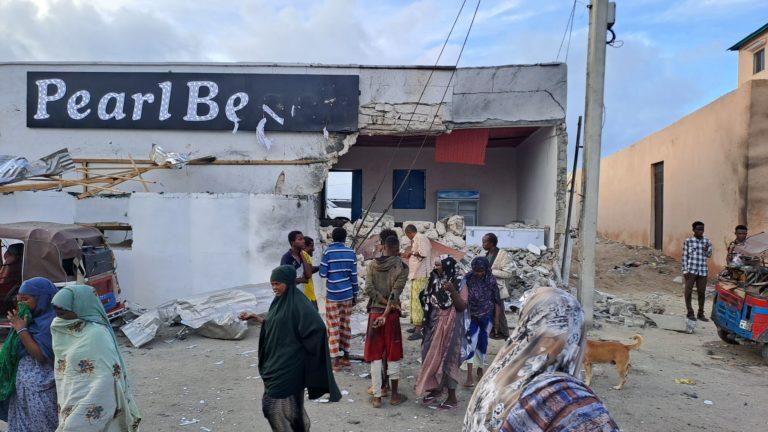
WHO Staff Member Killed in Terrorist Attack in Somalia
A staff member of the World Health Organization (WHO) in Somalia was among the 16 civilians killed in a terrorist attack on a hotel in the capital Mogadishu on Friday night, the WHO confirmed.
The attack by al-Qaeda affiliate al-Shabaab targeted the Pearl Beach Hotel and Restaurant, an upscale location on Lido beach often frequented by high-ranking government officials and foreign diplomats.
The militants’ siege lasted over 10 hours before local security forces regained control of the hotel, killing seven attackers. Ten civilians were injured while 84 were successfully evacuated during the attack, according to a statement by Mogadishu police.
Footage showing the destruction to the entrance of the Pearl Beach hotel & restaurant in #Mogadishu.
Gunmen from #AlShabaab are still held up inside the upscale establishment. #Somalia pic.twitter.com/ut2VeDdnU4
— Mohamed Gabobe (@Mohamed_Gabobe) June 9, 2023
The WHO staffer killed in the attack was identified as Nasra Hassan, a 27-year-old female Somali national. Hassan joined the WHO country office in Somalia to support the agency’s drought emergency response operations in the southern region of Jubaland.
“We condemn in the strongest terms this heinous attack on a hotel that claimed so many lives, including the precious life of one of our dearest colleagues, Nasra,” Dr Malik Mamunur, WHO representative in Somalia said. “We condemn all attacks on innocent civilians and humanitarian workers and express our deepest condolences to the family members of all those who were killed in this attack.”
Around 1.1 million Somalis have been displaced by droughts since January 2021. Last year, as many as 43,000 people died as a result of the record droughts sweeping the country. Half of them were under the age of five, according to a report by the Somali government and the United Nations agencies.
🇸🇴 – Drought killed at least 43,000 people in Somalia last year
• Hunger is deadliest in Somalia since famine of 2010-11, which claimed 260,000 lives
• Extreme weather (fuelled by climate change), jihadists and Ukraine war were among key factors pic.twitter.com/1NEzgpimYC— Agathe Demarais (@AgatheDemarais) April 3, 2023
The hotel attack occurred just a week after the bodies of 54 Ugandan peacekeepers were found dead at a military base 130km from the capital. The increase in al-Shabaab attacks across the country in 2022 resulted in the deadliest year for Somali civilians since 2017, UN Secretary-General Antonio Guterres told the security council in February.
Despite the unrest, WHO said it remains committed to working with the Somali government and local partners to address ongoing health needs and emergencies across Somalia.
“WHO is committed to continuing efforts to preserve health and respond to emergencies in Somalia,” the organization said in a statement, adding that the safety of WHO staff is a “paramount factor in ensuring ongoing life-saving response operations”.
WHO has delivered around $5 million of medical supplies in the past year. This aid is focused on essential health and nutrition care for Somalis affected by the extreme drought and food insecurity sweeping the wider Horn of Africa.
The extreme droughts in the Horn of Africa are considered a “grade 3” emergency by WHO, the organization’s highest alert level. Other “grade 3” crises include the humanitarian situation in Afghanistan and the ongoing conflicts in Ukraine, Yemen, Ethiopia and Syria.
About 3.5 million children under five were vaccinated against polio, measles, and cholera or protected against malnutrition under WHO programmes in 2021. The UN health agency has also worked with federal and state ministries of health across Somalia to establish a medical supply chain that can reach the most vulnerable people in the country.
“Being a health professional and working in a resource-starved and geographically challenged health system in a conflict zone, WHO supplies are proving to be a lifeline for millions,” Dr Yusuf Omar Mohamed, head of pharmaceuticals and supply chains at the Somali Ministry of Health said of WHO’s operations in the country. “Everyone wondered how a medical supply chain could work in Somalia, but I believe WHO has shown it to the world that if there is a resolve to serve humanity, obstacles can be turned into opportunities.”
Source » healthpolicy-watch





